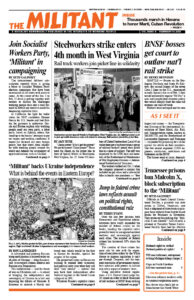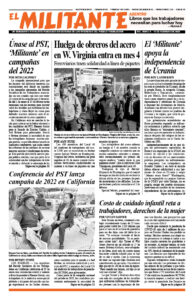February 17, 1997
DERRY, Northern Ireland — “You are a heart-warming sight,” Martin McGuinness told a crowd of 40,000 marchers here Feb. 2, the culmination of four days of events to mark the 25th anniversary of the massacre by British Paratroopers of 14 unarmed civil rights demonstrators. McGuinness is a leader of Sinn Fein, the nationalist party fighting for a united Ireland. He and other speakers called for an international inquiry into the events of Bloody Sunday, as the day is known here.
Thousands of people from the working-class Catholic neighborhoods of the Creggan and Bogside joined contingents from throughout the British-occupied northern six counties.
The aim was an inquiry that would tell the truth about what the British troops did, and smash the official report that exonerated the killers. The British government has so far rejected these calls.
February 18, 1972
President Nixon’s trip to Peking “is the key to his bid for reelection as ‘a man of peace,’” wrote James Reston, Washington editor of the New York Times, Jan. 12.
The implications of Washington’s rapprochement with Peking are far from peaceful, whatever mileage Nixon hopes to gain from them in the 1972 elections.
Washington’s objective is to use Peking’s policies of peaceful coexistence to strengthen imperialism’s drive to contain the colonial revolution, particularly in Southeast Asia. Nixon wants Chairman Mao to bring pressure on Hanoi to reach a settlement that will redivide Indochina and leave the imperialists their foothold in Saigon.
The antiwar movement in this country can help to relieve the pressure on Vietnam by continuing its efforts to bring about a complete and immediate withdrawal of U.S. forces from Southeast Asia.
February 15, 1947
The CIO Oil Workers International Union has just given a dollars-and-cents demonstration of the value of the sliding scale of wages that provides automatic pay rises to meet rises in living costs. Under an escalator clause in the contract with Sinclair Oil Company, some 7,000 members received an automatic seven-cent-an-hour wage boost.
The cost-of-living raise is in addition to a flat wage increase of 18 cents an hour secured in the contract signed on Nov. 15, 1946. Had the other CIO unions fought for and won such a clause before the war, wage rates would now be double what they are in terms of the cost of living.
The unions should demand escalator clauses retroactive to last June, at least, which would provide wage raises of 30% to 35% right now. The unions should insist on tangible protection from the effects of any further inflation.

